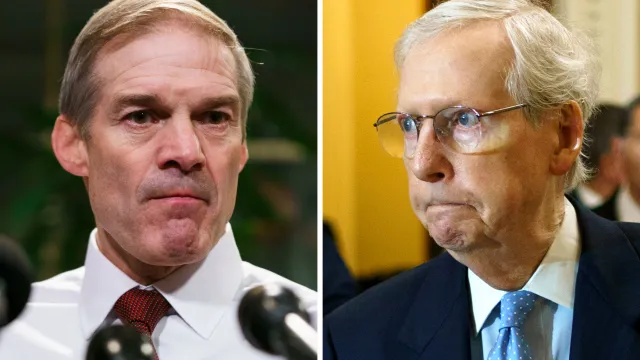Two GOPs
A policy-leaning wing and a political-leaning wing make for an unworkable coalition.

POLITICO politics bureau chief Jonathan Martin offers this explanation as to “Why the GOP Can’t Unite.”
There is no longer a cohesive Republican Party. There’s a pre-Trump GOP and a post-Trump GOP, living together uneasily. They may be roommates but they’re not married.
Which is why it was unintentionally unironic for Rep. Jim Jordan (R-Ohio), after watching 20 Republicans oppose his candidacy for speaker, to lament what could come next in the House. “No one in our conference wants to see any type of coalition government with Democrats,” Jordan told reporters after the first vote Tuesday.
Yet that’s precisely what his own conference has become — a would-be coalition government, if under the same banner. The fitful and still fruitless negotiations that have taken place since Kevin McCarthy’s ouster two weeks ago are closer to a European-style coalition-led parliament struggling to be born than a factional dispute within an American party.
But don’t take my word for it.
At about the same time as Jordan was making those comments, I was sitting down with perhaps the purest archetype of the pre-Trump GOP, the man who was seen as the future of the party 11 years ago this fall.
“It’s basically a bifurcated coalition government,” former House Speaker Paul Ryan said of the Republican conference he once led.
Former President Donald Trump’s takeover of the GOP has accelerated the remake of Congress, where Republicans in his image have been arriving since 2018 while those anchored in the Ryan-era party have either followed the former speaker’s path to the exits or accommodated the party’s transition.
“This is a political-leaning conference right now, not a policy-leaning conference,” Ryan told me. Which makes sense, he added, because “our party is a populist-leaning party right now, not a policy-leaning party.”
That there is a wing of the Republican Party that wants to govern and a wing that wants to burn the whole thing down has been apparent for quite some time. What’s hard to gauge, because most of the “normies” have proven themselves spineless, is how large the two factions are.
At the same time, Martin’s origin story just doesn’t add up. The Tea Party and the so-called Freedom Caucus didn’t emerge in 2018, or even 2016. But, rather clearly, they have held the whip hand since Trump was elected.
Apropos Martin’s column, a report in POLITICO (“Senate fills the void as House GOP burns from within“) illustrates the schism.
With the House effectively shut down, the Senate has the upper hand on Washington’s two biggest issues this fall — aiding Ukraine and Israel and keeping the government open.
Even if the House GOP selects a speaker or a caretaker leader to claw out of the current chaos, its Republicans will already be in a weakened state as the White House prepares a massive, potentially $100 billion request for national security aid. Instead, Minority Leader Mitch McConnell’s Senate GOP looks to have the Republican sway over both that foreign money debate and the fight to avoid a shutdown.
As his last act before getting ousted, Rep. Kevin McCarthy (R-Calif.) made the Senate swallow a spending bill without Ukraine aid that his conservative members opposed. But with a Nov. 17 shutdown deadline less than a month away and Ohio GOP Rep. Jim Jordan’s speaker bid sputtering, the next confrontation over federal funding is looking very different.
That’s in large part because McConnell, after enduring public scrutiny of his health all summer, is embracing a generous aid package for Ukraine and Israel and is in harmony with Senate Majority Leader Chuck Schumer on the framework of that legislation. The Senate minority leader faces real internal opposition of his own, but at the moment his anti-shutdown, pro-Ukraine position at least gives Democratic leaders a Republican they can talk to.
It’s a harsh unintended consequence for the House conservatives who ejected McCarthy: The Senate minority leader who many of them abhor is, for the moment, the most influential leader in the congressional GOP.
There’s a faction of the OTB commentariat who dismiss the notion that there are “wings” of the GOP, lumping them all together as crypto-facists. But, while there’s plenty to criticize McConnell for, he has survived as his party’s Senate leader for almost seventeen years now because he’s able to build coalitions and navigate the policy space. When he’s in the majority, he gets bills passed. When he’s in the minority, he blocks bills and/or extracts policy concessions for letting them pass.
Now, part of this is simply the difference in the design of the two Houses. Senators are elected statewide for six-year terms while Representatives are (mostly) elected from smaller districts that are often (usually by design) skewed toward a given political party.
Regardless, the effect of what Ryan dubs the political-leaning wing having undue sway in the House means that we’ve flip-flopped the normal order of things. Both because of the above-mentioned design and the evolution of rules like the filibuster, the Senate has always served as the “saucer” as compared to the House’s “cup.” The House was where new policy ideas got passed into law and the Senate is where they went to die. Now, the Senate has to cajole the House to pass any bill at all.
Indeed, as The Hill‘s Alexander Bolton (“McConnell, Jordan would be ultimate GOP odd couple“) notes,
Senate Republican sources point out that McConnell has often had to step in to clean up the political messes caused by Jordan and other members of the House Freedom Caucus, such as the brinksmanship that nearly caused a national default in 2011 and a 16-day government shutdown sparked by a fight over the Affordable Care Act in 2013.
Jordan declared in 2011 that conservatives in the Republican Study Committee, which he led at the time, would oppose McConnell’s plan to raise the debt limit by putting the burden on then-President Obama to request debt increases and give congressional Republicans to vote for resolutions of disapproval.
In 2013, Jordan pressured House GOP leaders to add language to a short-term government funding bill to defund ObamaCare, which resulted in a shutdown that McConnell likened to “the second kick of a mule.”
More recently, McConnell broke with the House Republican efforts to challenge the results of the 2020 election, which Jordan helped lead, and warned the House about launching another round of impeachment proceedings, calling impeachments generally “bad for the country.”
McConnell knows how to throw a political punch and Democrats have loudly complained about his partisanship over his more than 16 years as Senate Republican leader, but throughout that time he has prided himself on governing, even if the deals he cut with Democrats unpopular with his party.
Jordan, by contrast, has been a leading antagonist of House Republican leaders. He founded the House Freedom Caucus to pressure GOP leaders to move rightward and helped push former Speaker John Boehner (R-Ohio) from power.
To be sure, as part of keeping a motley caucus running, McConnell has used questionable tactics (the stonewalling of Merrick Garland being the most obvious case) and been feckless on key issues (impeaching Trump in the wake of the Capitol Riots being the most egregious case). But, at the end of the day, he understands that budgets and laws have to get past and that this requires getting some Democratic votes. That puts him and his wing in effectively a different party than Jordan and his ilk.

![House Leadership Crisis Continues [Updated]](https://otb.cachefly.net/wp-content/uploads/2023/10/jim-jordan-weirdo-512x256.webp)




Who was it who said here weeks ago that the Republicans may be a majority (in the House), but they are not a party? Oh, that was me.
Two GOPs. Both shite if in different ways.
That wouldn’t be me. I see all kinds of factions in the GOP, it’s just that I don’t think they matter. Who has control of the party? Who has control of the agenda? For any legislation of any significance (environment, taxes, investment, health care, etc) those factions don’t matter. It’s the patrons of the Republican Party that sets the agenda on these things and however much an individual or faction might want to go against that agenda they will only be allowed to do so when their votes won’t matter, and even then only very, very sparingly lest their patrons decide they would be better off redirecting campaign funds to a primary opponent.
I think these two thoughts go well together. Starting with the Tea Party makes sense as I think that’s when we first saw major inroads for the “burn-it-all-down” section of the House. And you are totally right that this is, in large part, due to the current structure of the capped House and modern political primaries.
With Trump–perhaps riding his coattails in 2016–there was an influx of more of these members (in particular Matt Gaetz). Because the House is structured in such a way that a few reps is all you need to fracture a coalition, and because the Young Guns had gotten rid of most of the traditional controls on back-benchers, this created a lot of headaches for Paul Ryan and enabled Nancy Pelosi to run circles around them.
The Democrat take-over of the House in 2018 led to a number of more traditional Republican Reps retiring in 2020 (when MTG and Lauren Bobert were both elected). That created more room at the margins for the wedge and paper-thin majorities.
So it makes sense from a structural perspective that those cultural forces are exacerbating structural issues between Republicans across the two Houses of Congress.
McConnell’s biggest mistake was not getting behind the impeachment of Trump the second time so that he was forbidden from holding office. There would have been some short-term GOP pain, but it would have changed the dynamic of the party because while the crazies would have made a lot of hay out it, there would have been no kowtowing to Trump and the leadership of the party would have fragmented.
I can’t say I like Mitch McConnell, but I am quite sure that he is not an insurrectionist. Jordan is. That seems a distinction worth making.
And I cannot stress enough that none of the democratic incentives in our political structures encourage broad appeals, but instead incentive building (and maintaining) careers via appeals to factions of the population.
Structures and the incentives they create matter.
The various Doctors Frankenstein are unhappy with how their handiwork turned out.
@Jay L Gischer:
That’s right. McConnell believes in throwing elections the old fashioned way, by buying them. When I lived in Cincinnati I could watch across the river as Moscow Mitch ignored KY, then every six years flooded the state with ads. But he still used the culture war tactics that led to Jordan and Gaetz.
@Steven L. Taylor:
100% this. They probably would not have taken control of the House in 2022. They very well might have run the Senate. And they would be in no worse a position than they currently are with respect to the 2024 election (and possibly better off).
@Jay L Gischer:
Yup.
Jordan is the kind that will burn everything down.
Mitch is the kind who will get out of Jordan’s way, hand him gasoline and a match, and then deplore the results as he mutters something about the Democrats.
@Steven L. Taylor: I’ve been rereading The Open Society. Popper advocates the system shouldn’t depend on good people as leaders, because history shows politics will provide bad people.
BTW, It looks like interim speaker McHenry, depending on how the Krazies vote, and what Jeffries decides to do.
@gVOR10:
Yep. That notion goes back to Aristotle and is a key component of Madison’s writings on institutional design.
@Steven L. Taylor: Our system has been described to me as “a system designed by geniuses to be run by idiots.”
@Grumpy realist: That very phrase appears in The Caine Mutiny as a description of the Navy. I always liked it.
I agree that there are wings to the GOP but McConnell is a terrible example. He’s an arsonist as much as Jordan. He has destroyed so many senate norms so he could be king of the ashes, just ask Merrick Garland. The difference between McConnell and Jordan is simply competence.
@Steven L. Taylor: I would appreciate your latest thinking on why the Democratic Party – with the same political structures and democratic incentives – has not succumbed to the chaos and dysfunction that has overtaken the GOP.
To my mind, the structures and incentives exacerbate the problem, but they aren’t causing the problem and, as such, the GOP isn’t without agency even if our political system is broken as you repeatedly remind us (and which I completely accept as true). The cause of the GOP’s problems is a series of choices made by a critical mass of the establishment wing of the Republicans that started around the time of Gingrich. The GOP chose uncompromising policy positions over moderation. (RINOs are a thing, while DINOs simply are not.) And since uncompromising policy positions are by their nature unpopular, minority rule through voter suppression and gerrymandering was the only way to hold power.
The Republicans are in disarray because No Compromise is a very poor fit with democracy and the US has not (yet) given over to Authoritarianism.
I find myself in a weird position saying this, I hate Mitch McConnell with a fiery passion. I will do a nice little dance the day he dies, hopefully after being incapacitated in a terrible suffering filled way. He is worse than the Jordans, Gaetz, Boberts cause he knows better. He’s a smart, evil dude.
That being said, if he dies in the next couple of weeks, that would probably be the worst thing that could happen to this country short of a nuclear attack. I think his talent and skill is the only thing holding the Senate Republicans together. If he goes, they are all instantly at each others throats the same way the House is.
@Matt Bernius:
Indeed. The Tea Party was astroturfed with Koch Money. Jordan’s biggest donor is Koch Industries at 23 million over the years. Same song, different verse. It ain’t just Trump.
@Scott F.:
I think the seeds of the modern GOP go back way before that. You have the effort during the Reagan to bring Evangelicals into the fold–something that Barry Goldwater spoke against at the time: https://www.washingtonpost.com/archive/politics/1981/09/16/goldwater-lashes-religious-pressure/b1caa379-49fa-4e04-82de-dccda6f5e7f9/
Of course, it goes further back than that, speaking of Goldwater, whose 1964 Presidential Run was another important marker in the issue. As far back as the Lilywhite Movement, the Republican party had a strong anti-black component. That group grew throughout the first half of the 20th Century until, around the time of Goldwater, the Southern Realignment began to happen. And at the same time the Black wing of the Southern Republican Party (The Black and Tan Republicans) lost more and more power.
Jackie Robinson marked the 1964 Republican national convention as the year the party began to openly turn against Black Republicans like him. That racial realignment, mixed with White Evangelicalism, is still playing out to this day.
@Scott F.: I too, would like to hear what Steven has to say on this.
My own take is this: Democrats have rough agreement on what they want the government to do. Republicans have no such agreement. What they agree on is that they hate Democrats. But that’s not policy. They don’t have any ideas (beyond stuff that is unpopular and will never get through) that they all agree on.
Trump’s very candidacy made this clear. He quite clearly and visibly turned away from the effort to defund or privatize Social Security and Medicare.
@Matt Bernius: I agree that the seeds of the misogynist, xenophobic, and racist elements of the modern GOP were planted further back in US history. But, in my experience, Republicans were okay with working toward ends in that direction through more moderate means, content to use dog-whistles to maintain an air of reasonableness and accepting compromises to achieve incremental gains up until Gingrich (coupled with the rise of Fox and Limbaugh).
The all-or-nothing approach is a newer development. The Republican rank and file hated conceding anything, while Republican leaders grew tired of trying to sell partial policy wins as progress. It was easier to forego compromise and shift to minority rule by leveraging their media organs to characterize the opposition as demonic and capitalize on their advantages within the US electoral system.
@Scott F.:
I think you need to include those factors because bringing those folks into the mix meant starting to bring more strident reactionaries into the fold. That change in the base began to crowd out the traditional Rockefeller Republicans.
Also, you’re right about Limbaugh but a little off on the timing. Limbaugh and conservative talk radio predates Gingrich by years. And that also moved the base toward a more uncompromising position (as did GWHB’s loss).
I completely agree that Gingrich is an important inflection moment and things began to very visibly change. I also think it’s important to realize that like an iceberg whatever we see above the water is the visible part of something much bigger.
@Matt Bernius:
I would put it slightly differently. The inflection point was when there were no longer enough voters willing to vote for traditional conservatives. Conservatism wasn’t a winning electoral strategy, on its own. Given a choice between being a perpetual Loyal Opposition and finding a different path to power, the GOP opted to go all in on culture wars and populism, offering bigotry and xenophobia and theocracy to those willing to vote for wealth protection.
And it worked, for 50 years… but inevitably it brought us to where we are now. I will be interested to see if the plutocrat GOP donors see clearly enough to stop funding MAGA candidates. Even Democrats are better for billionaires than dysfunctional chaos, and the billionaires are now protected by their pet SCOTUS.